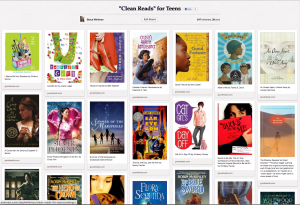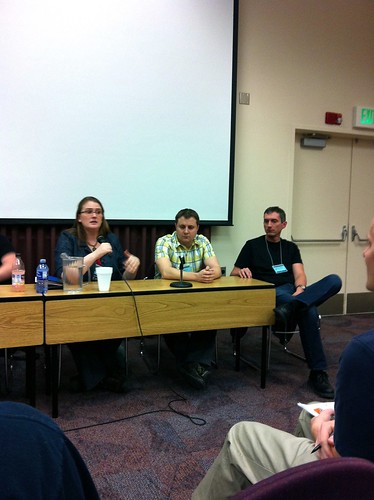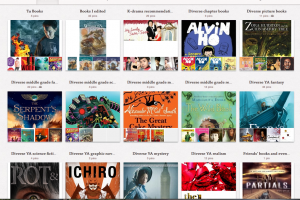 ETA 11/6/12: As with all my book lists, I’m putting this on Pinterest so I can more easily keep this list up-to-date. For a more recent version—including the books mentioned below and books published since 2010—see my Clean Reads for Teens board.
ETA 11/6/12: As with all my book lists, I’m putting this on Pinterest so I can more easily keep this list up-to-date. For a more recent version—including the books mentioned below and books published since 2010—see my Clean Reads for Teens board.
I have a friend who is the leader of a church group for girls 12-18, and she asks:
I want to set up a little library for our YW. [Young Women] These are multi-cultural girls, low income, some from illegal families. I would love to get your suggestions as to good books to put in the library. Since the library will be at the church, they do need to be on the “clean” side, but the girls range from age 13-17 and I think can handle some more complicated themes.
I have a start of a list here, but would love your additions to the list. “Clean” should include nothing stronger than “darn” or the occasional “crap” or “hell,” and on-screen violence should be kept to a minimum; no sex/sexual conduct beyond kissing/holding hands (at least, not in-scene), though romance is great. That doesn’t mean that it wouldn’t handle tough subjects, though. The Maze Runner, for example, is dystopian, but still a clean read overall. Even a book that tackled rape and its aftermath, or something similarly violent, could be appropriate for a list like this depending on how it’s written.
In general, I’m an advocate for good literature over judging a book by what isn’t in it, and my friend is that kind of reader, too. But given that this is a church-associated library, the suggestions do need to be “appropriate,” if you know what I mean. Feel free to suggest titles that might not be shelved in a church library ONLY if they’re borderline (i.e., something my friend my suggest the girls look up on an individual basis if she feels they’re ready for them).
For example, The Hunger Games may not be for everyone. I love it, and would hand it to any teen I knew who didn’t have a problem with a little violence. But some teens are more sensitive than others, so it might be important in a church context to gauge just how well the reader might welcome the visuals they’d get from that book, especially when it might as easily be picked up by a 12-year-old as a 15-year-old. (Then again, given that we live in a dystopia and modern teens know it, perhaps they’d be just fine with it.) Public library, no problem. But it’s the kind of thing that a conservative church library might not be the best place for.
This is NOT a fantasy-only list. Feel free to add YA-appropriate “clean reads,” particularly but not limited to multicultural books, from any genre. I’m just biased for SFF, that’s all. 🙂 It is a tough list to assemble, though, because I hate to recommend something as “clean” when I haven’t had a chance to read it myself.
- The Maze Runner, James Dashner
- The Sisters Grimm series, Michael Buckley *
- Conrad’s Fate, Diana Wynne Jones
- The Dalemark Quintet, Diana Wynne Jones
- A Wrinkle in Time, Madeleine L’Engle and its sequels
- Matched, Ally Condie (to be published in Nov. 2010)
- The Princess and the Hound, Mette Ivie Harrison, and its sequels
- Princess of the Midnight Ball, Jessica Day George, and its sequel Princess of Glass
- Moribito: Guardian of the Spirit, 2008, Nahoko Uehashi, and its sequel, Moribito II (this is technically a middle grade book, but the cool thing about it is that it can be appreciated by all ages–the main character is a 29-year-old woman who protects a young king)
- Wildwood Dancing, Juliet Marillier
- Book of a Thousand Days, Shannon Hale
- Flora Segunda, Isabeau S. Wilce, and its sequel Flora’s Dare
- Little Sister, Kara Dalkey, and a sequel
- The Hero and the Crown, Robin McKinley
- The Blue Sword, Robin McKinley
- Foundling (Monster Blood Tattoo #1), D.M. Cornish, and its sequel, Lamplighter **
- Uglies, Scott Westerfeld, and its sequels ***
- Midnighters series, Scott Westerfeld ***
- When My Name Was Keoko, Linda Sue Park
- A Single Shard, Linda Sue Park
- The Goose Girl, Shannon Hale
- Princess Academy, Shannon Hale
- Enna Burning, Shannon Hale
- Impossible, Nancy Werlin *** (this one has some really tough themes—rape, single teen motherhood, manipulation and control—but for a mature teen reader, it’s a must-read)
- Sabriel, Garth Nix, and its sequels Lirael and Abhorsen
- Tantalize, Cynthia Leitich Smith, and its sequels *** (possibly too much sensuality, according to the author, and a possible replacement would be her Rain Is Not My Indian Name)
- Sucks to Be Me, Kimberly Pauley
- Silver Phoenix, Cindy Pon
- Devil’s Kiss, Sarwat Chadda *** (strong themes of sacrifice and redemption)
- Howl’s Moving Castle, Diana Wynne Jones, and its sequels
- The Ear, the Eye, and the Arm, Nancy Farmer
- The House of the Scorpion, Nancy Farmer ***
- The Devil’s Arithmetic, Jane Yolen
- The Witch of Blackbird Pond, Elizabeth George Speare
- Roll of Thunder, Hear My Cry, Mildred D. Taylor
- Blue Willow, Doris Gates
- Beauty, Robin McKinley (and she rewrote this same tale later as a more complicated book, Rose Daughter)
- The Perilous Gard, Elizabeth Pope
- The Agency: A Spy in the House, Y.S. Lee
- The Agency: The Body at the Tower, Y.S. Lee
- The Hallowmere series, Tiffany Trent and coauthors (be forewarned, though, that it’s out of print and only 6 of 10 books were published, so the end is on hold indefinitely)
There are so many books I want to recommend but can’t, because in this case a book with even the occasional s-word wouldn’t be something we’d want to put in a booklist handed out at church or in a church library. That leaves out excellent titles such as The Absolutely True Diary of a Part-Time Indian by Sherman Alexie, but hopefully the girl who is the right reader for that book will find it anyway.
So, that gives us a starting point. What other books might be suggested for this list? I’m low on historical fiction, contemporary realism, and non-fiction, mostly because I’ve just listed a few good books off my own shelves and pulled a few titles from the multicultural SFF post. There are SO many titles about civil rights and slavery—feel free to suggest some, as I only have one on this list—but there are so many other time periods and issues that books tackle, too. So, light and heavy, as long as its clean. Go!
* Technically, this is a middle grade series, but the books are loved by older girls too and I think would be a fun recommendation for girls who like fairy tales.
** Starred titles may have a little bit more violence than you might want in the library; you might want to read it first to be sure.
*** Can someone remind me, as it’s been a while, whether the language in these books goes beyond made-up cursing and slang? Or if, in the case of Impossible, the rape scene is too graphic for a conservative audience?




